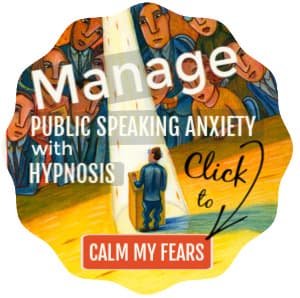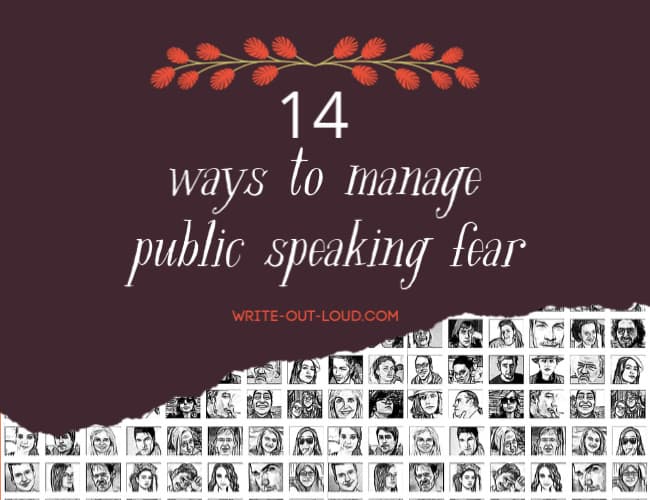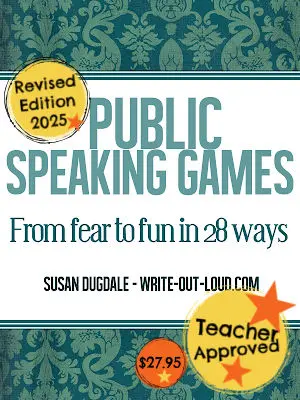The fight or flight response
Understanding public speaking fear
By: Susan Dugdale
You can thank your fight or flight response, an ancient survival mechanism, for any physical manifestations of anxiety you experience when you are about to do anything you find challenging, like having to give a speech in public.
Regardless of their intensity - from mild to extreme - all of them are "normal" reactions to either real or perceived danger.

Instinct rules the fight or flight response
Many years ago, when our ancestors lived in caves, their continued existence was utterly dependent on how well they read and responded to danger.
Those methods for recognition and response to threat were literally hot-wired into their systems. They have been passed down through generation after generation and underpin the reactions to real (or perceived) danger we experience today.
The fight or flight response is automatic and by-passes the rational or conscious mind. We do NOT choose to feel threatened or suffer anxiety. It is an instinctive response, happening unconsciously, of its own accord.
Chemical alert
What happens at a physiological level is that once the response is stimulated, a part of the brain called the hypothalamus sets off a series of actions preparing the body for either battle, (facing the danger; that is, fight), or running, (escaping the threat, that is; flight).
Chemicals such as adrenaline, nor-adrenaline and cortisol are released into the bloodstream and complex patterns of nerve cell firing occur.
Our body is put on a state of high alert. Our breathing and heart rate quickens. Our muscles are tightened. We sweat. We tremble. We become either flushed, or very pale.
We are hyper-vigilant, sensitive and our body's entire focus is repelling the threat.
Bodily functions deemed non-essential are slowed down as the energy keeping them in optimum functioning condition is temporarily refocused elsewhere.
Because you don’t usually stop to either make a speech or grab something to eat while fighting or running for your life, the systems governing voice and digestion are affected. Your mouth may feel very dry, and when you try to speak, you squeak. Or you might need to visit the bathroom very quickly.
The degree to which we feel challenged directly corresponds to the loss of functioning we experience. The symptoms range from mild to severe accordingly.
The fight or flight response has no mind
What is important to remember about our fight or flight response, is that it overrides or bypasses the mind. It is NOT a consciously controlled reaction.
We do not select the circumstances triggering it into action. It goes to work regardless of the type of threat. In other words it is activated whether the threat is perceived, (only in our minds), or real.
It can be positively heroic

It can work positively allowing ordinary people to become heroes.
For example the massive surge of adrenaline and allied stress hormones will enable a mother to lift a car off her injured and trapped child or the fireman to rescue people from a blazing building.
Once the danger is passed the body returns to normal.
Or definitely negative
Or the flight or flight response can work negatively and against us.
In these instances we perceive challenges in our everyday life as threats and react accordingly.
For example, having to sit an exam, go to a job interview, drive on an unfamiliar road, spiders, flying in a plane, or give a speech, can all trigger extreme fight or flight responses in some people.
When person lives in a constant state of extremely heightened anxiety or fear it can cause significant emotional, mental and physical health problems.
If that's you, please get help.
You may like to start by investigating self-hypnosis using downloads that have been prepared by experts. This is a proven, effective, gentle, and affordable option.
Click the link or the image to find out more: Manage public speaking anxiety with hypnosis.
Affiliate disclaimer
When you purchase a self-hypnosis course from Hypnosis Downloads part of what you pay come to me. Thank you!
Managing anxiety positively
If you're reading this page because you're afraid of making a speech, (but not completely paralyzed by anxiety), these suggestions for overcoming public speaking fear are a good starting point.
Sign up for a free e-course
And you could sign up for my 7 part "Letting go of Fear" e-course. It's a compilation of all the useful strategies I know for exchanging public speaking anxiety for can-do, will-do confidence.
Suggestions to help children
If you're here on behalf of a child, check these self esteem builders. They're speech & drama exercises to boost and sustain confidence suitable from kindergarten upwards.
Further references
- How the Fight or Flight Response Works - Kendra Cherry, verywellmind.com
- Understanding the stress response - Harvard Health Publishing, Harvard Medical School

About the Author: Susan Dugdale, founder of write-out-loud.com, is a qualified teacher of English and drama with over 40 years of experience. Drawing on her professional expertise and her personal journey from shyness to confidence, Susan creates practical, real-world resources to help people find their voice and speak with power.





